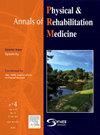Effects of mindfulness and exercise on cognition and emotion in adults with mild deficits in the chronic post-stroke phase: A randomized controlled trial
IF 4.6
3区 医学
Q1 REHABILITATION
Annals of Physical and Rehabilitation Medicine
Pub Date : 2025-08-21
DOI:10.1016/j.rehab.2025.102008
引用次数: 0
Abstract
Background
Individuals with stroke often face cognitive and emotional challenges. Mindfulness-based stress reduction (MBSR), physical exercise (PE), and computerized cognitive training (CCT) are promising approaches to incorporate into post-stroke rehabilitation.
Objectives
To determine whether adding MBSR or PE to CCT improves cognition and mental health more than CCT alone, and whether any benefits are mediated by gains in mindfulness or fitness.
Methods
The MindFit Project was a single-blind, parallel, 3-arm randomized controlled trial enrolling participants with chronic stroke, assigned to MBSR+CCT, PE+CCT, or CCT-only (1:1:1). All 12-week, home-based interventions were delivered online, with 5 sessions per week. The primary outcomes included 3 cognitive and 2 mental health measures; mindfulness and physical fitness were also assessed. Analyses used per-protocol and intention-to-treat approaches.
Results
A total of 141 individuals (mean [SD] age 57.7 [11.2] years; 40 % women) were randomly assigned to 3 groups (47 each). Participants were 28.54 (20.35) months post-stroke with a mean modified Rankin Scale score of 2.23 (1.04). Of these, 78 % (39 in MBSR+CCT, 34 in PE+CCT, and 37 in CCT-only) achieved an adherence rate of ≥80 % and were included in the per-protocol analysis. No significant between-group differences were found in primary outcomes (all P > 0.05). For secondary outcomes, the PE+CCT group showed significantly greater gains in leg strength than the others (F = 7.50, adjusted P = 0.009). These results were consistent with the intention-to-treat analysis. In the per-protocol sample, improvements in mindfulness significantly mediated emotional outcomes in the MBSR+CCT group (B = –1.08; 95 % bootstrapped CI, –2.77 to –0.01).
Conclusions
In participants with predominantly mild chronic post-stroke deficits, adding MBSR or PE to CCT did not improve primary cognitive or emotional outcomes beyond CCT alone. However, PE+CCT increased fitness, and MBSR+CCT yielded mindfulness-mediated emotional gains. Future studies involving larger and more severe stroke samples are needed.
Trial registration
NCT04759950 (www.ClinicalTrials.gov).
正念和运动对慢性中风后轻度缺陷成人认知和情绪的影响:一项随机对照试验
中风患者经常面临认知和情感方面的挑战。正念减压(MBSR)、体育锻炼(PE)和计算机认知训练(CCT)是卒中后康复中很有前途的方法。目的确定在CCT中加入正念减压或体育锻炼是否比单独加入CCT更能改善认知和心理健康,以及是否有任何益处是通过正念或健康的提高来介导的。方法:MindFit项目是一项单盲、平行、3组随机对照试验,纳入慢性卒中患者,分为正念减压+CCT、PE+CCT或仅CCT(1:1:1)。所有为期12周的以家庭为基础的干预都是在线进行的,每周5次。主要结局包括3项认知和2项心理健康指标;专注力和身体健康也被评估。分析使用了按协议和意向治疗方法。结果141例患者(平均[SD] 57.7[11.2]岁,女性占40%)随机分为3组,每组47例。参与者在中风后28.54(20.35)个月,平均修正Rankin量表得分为2.23(1.04)。其中,78% (MBSR+CCT组39例,PE+CCT组34例,仅CCT组37例)达到≥80%的依从率,并纳入每个方案分析。各组间主要结局无显著差异(均P >; 0.05)。对于次要结果,PE+CCT组的腿部力量比其他组明显增加(F = 7.50,调整后P = 0.009)。这些结果与意向治疗分析一致。在每个方案样本中,正念的改善显著调节了MBSR+CCT组的情绪结果(B = -1.08; 95%自举CI, -2.77至-0.01)。结论:在主要为轻度慢性卒中后缺陷的参与者中,在CCT中加入正念减压或体育锻炼并没有比单独CCT改善主要的认知或情绪结果。然而,体育锻炼+CCT增加健康,正念减压+CCT产生正念介导的情绪收益。未来的研究需要涉及更大、更严重的中风样本。试验注册nct04759950 (www.ClinicalTrials.gov)。
本文章由计算机程序翻译,如有差异,请以英文原文为准。
求助全文
约1分钟内获得全文
求助全文
来源期刊

Annals of Physical and Rehabilitation Medicine
Medicine-Rehabilitation
CiteScore
7.80
自引率
4.30%
发文量
136
审稿时长
34 days
期刊介绍:
Annals of Physical and Rehabilitation Medicine covers all areas of Rehabilitation and Physical Medicine; such as: methods of evaluation of motor, sensory, cognitive and visceral impairments; acute and chronic musculoskeletal disorders and pain; disabilities in adult and children ; processes of rehabilitation in orthopaedic, rhumatological, neurological, cardiovascular, pulmonary and urological diseases.
 求助内容:
求助内容: 应助结果提醒方式:
应助结果提醒方式:


